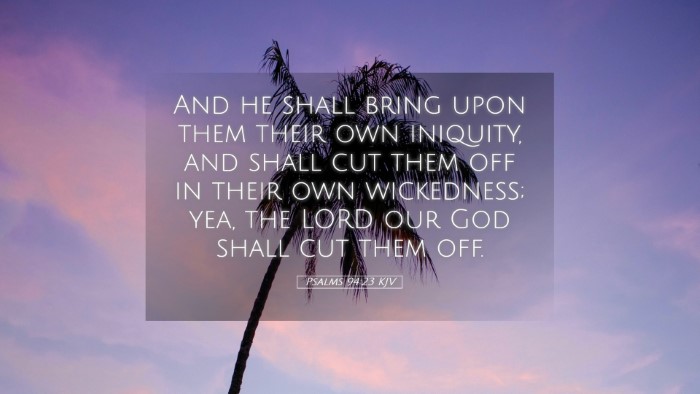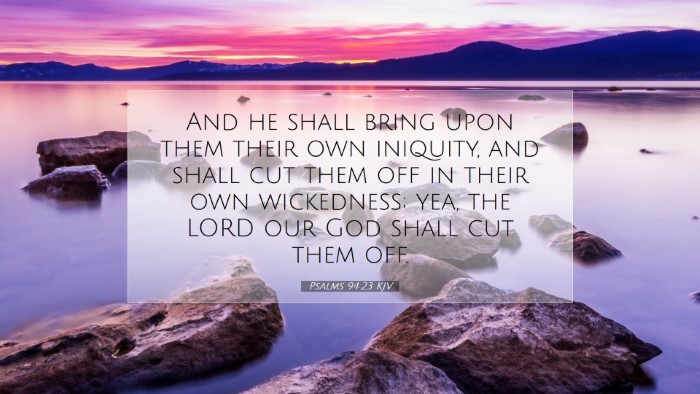Commentary on Psalms 94:23
Verse: "And he shall bring upon them their own iniquity, and shall cut them off in their own wickedness; yea, the Lord our God shall cut them off."
Introduction
The 94th Psalm is a reflection of the psalmist's profound anguish over the wickedness in the world and a call for divine justice. It captures the tension between the suffering of the righteous and the apparent prosperity of the wicked. In verse 23, the focus narrows to the inevitable judgment that God will execute upon the wicked—an essential theme in the broader narrative of justice found in the Scriptures.
Historical Context
This Psalm, attributed to an anonymous author, likely resonates with any period during Israel's history when injustice prevailed. It embodies the cries of oppressed believers seeking justice. Understanding the historical context allows for a deeper appreciation of the psalmist's desperation and the prophetic assurance of God’s intervention.
Exegesis of the Verse
- Divine Justice: The phrase "he shall bring upon them their own iniquity" indicates that God administers justice proportionate to one’s actions. This is a reflection of the divine principle of reaping what one sows, as expounded in Galatians 6:7.
- Inescapability of Divine Judgment: The assurance that God "shall cut them off in their own wickedness" signifies the certainty of divine retribution. Here, the psalmist emphasizes that evil will ultimately destroy itself through its own wickedness.
- God as the Righteous Judge: The declaration "the Lord our God shall cut them off" personifies God’s active role as a judge, reaffirming the covenant relationship between God and His people, in which He protects the righteous while punishing the wicked.
Insights from Public Domain Commentaries
Matthew Henry's Commentary
According to Matthew Henry, this verse encapsulates a profound truth about the nature of God’s justice. He elaborates that while the wicked may seem to flourish temporarily, they are in reality setting the stage for their downfall. Henry underscores the inevitability of divine retribution, stating that wickedness is counterproductive and self-destructive. He points out that the psalmist is confident in God’s complete sovereignty, assuring the faithful that despite present circumstances, God does not overlook sin.
Albert Barnes' Notes on the Bible
Albert Barnes emphasizes the concept of "iniquity" as not only personal but corporate, impacting nations and societies. He notes that God’s judgment is not merely a punitive reaction but a holistic act that restores order and righteousness. Barnes highlights that the psalmist expresses faith in God’s righteousness, believing that ultimate justice prevails despite visible injustices. The reference to "cutting off" suggests a finality and completeness to God’s judgment, asserting that those who persist in evil cannot escape their fate.
Adam Clarke's Commentary
Adam Clarke interprets this verse as a solemn warning to evildoers. He posits that God’s patience should not be mistaken for absence, and that the apparent successes of the wicked will ultimately yield to divine judgment. Clarke emphasizes the punitive nature of punishment as a method of restoring the moral order. Furthermore, he reiterates that God's actions provide comfort to the righteous, reinforcing their hope for vindication and ultimate justice.
Theological Implications
The verse serves as a theological cornerstone for understanding God’s nature as both loving and just. It calls believers to reflect on the implications of divine judgment and personal accountability.
- Hope for Justice: For pastors and theologians, this verse is a poignant reminder that there is hope in the face of adversity, urging believers to trust God's timing in administering justice.
- Moral Accountability: This passage emphasizes the principle that individuals and communities are held accountable for their actions, a concept central to Christian theology regarding sin and redemption.
- Encouragement to Perseverance: For students of theology, this reflects the necessity of persevering amidst oppression, assuring them that God’s righteousness will prevail.
Conclusion
Psalms 94:23 encapsulates a critical message about the assurance of divine judgment against wickedness, serving as a reminder of God’s faithfulness to His people. The insights derived from esteemed commentaries provide rich theological depth to this verse, reinforcing the importance of faith, righteousness, and the eventual triumph of justice. It invites pastors, students, and theologians alike to meditate on the dynamics of sin, justice, and redemption in their spiritual journey, affirming that the Lord, indeed, reigns as the ultimate Judge.


